
mastering-github-copilot-for-dotnet-csharp-developers
Master GitHub Copilot for C#/.NET development via this curriculum! Learn AI-driven paired programming, optimize your workflow, and write cleaner, faster code.
Stars: 93
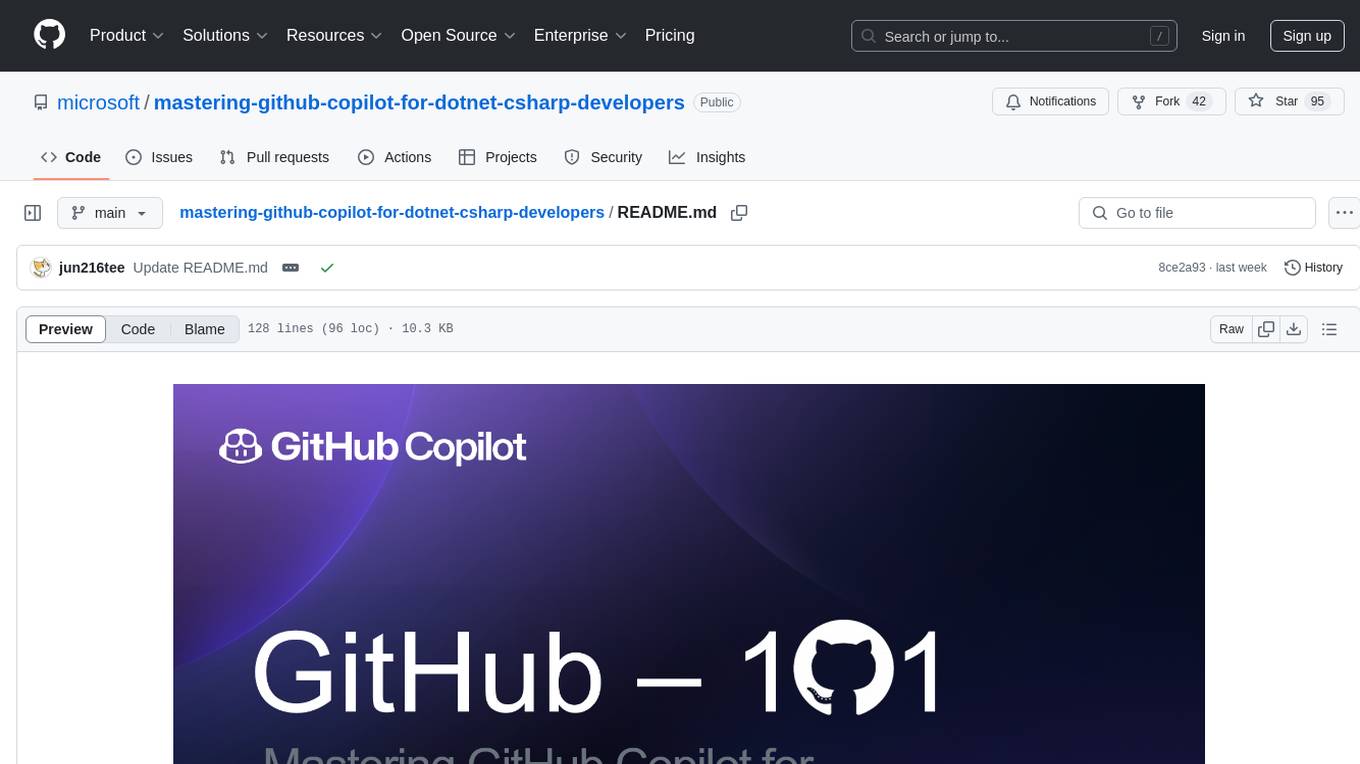
Enhance coding efficiency with expert-led GitHub Copilot course for C#/.NET developers. Learn to integrate AI-powered coding assistance, automate testing, and boost collaboration using Visual Studio Code and Copilot Chat. From autocompletion to unit testing, cover essential techniques for cleaner, faster, smarter code.
README:
Enhance your coding efficiency with our expert-led 6-lesson GitHub Copilot course tailored for C#/.NET developers. Learn how to seamlessly integrate AI-powered coding assistance into your workflow, automate testing, and boost team collaboration using Visual Studio Code and Copilot Chat. From intelligent autocompletion to streamlined unit testing, this course covers essential techniques to help you write cleaner, faster, and smarter code.
To get started, make sure to follow the instructions on how to fork the lessons into your own GitHub account. This will allow you to modify the code and complete the challenges at your own pace.
To use GitHub Copilot, you must have an active GitHub Copilot subscription.
Sign up for free here: GitHub Copilot.
To make it easier to revisit this repository in the future, you can also star (🌟) this repo this repo.
Below are links to each lesson—feel free to explore and dive into any topic that interests you the most!
| Language | Code | Link to Translated README | Last Updated |
|---|---|---|---|
| Chinese (Simplified) | zh | Chinese Translation (Simplified) | 2025-03-05 |
| Chinese (Traditional) | tw | Chinese Translation (Traditional) | 2025-03-05 |
| French | fr | French Translation | 2025-03-05 |
| Japanese | ja | Japanese Translation | 2025-03-05 |
| Korean | ko | Korean Translation | 2025-03-05 |
| Portuguese | pt | Portuguese Translation | 2025-03-05 |
| Spanish | es | Spanish Translation | 2025-03-05 |
| Turkish | tr | Turkish Translation | 2025-03-05 |
| Vietnamese | vi | Vietnamese Translation | 2025-03-05 |
After completing this course, check out our GitHub Copilot Learn Collection to continue leveling up your AI Paired Programming knowledge!
Sign up for Microsoft for Startups Founders Hub to receive free OpenAI credits and up to $150k towards Azure credits to access OpenAI models through Azure OpenAI Services.
Here are ways you can contribute to this course:
- Find spelling errors or code errors, Raise an issue or Create a pull request
- Send us your ideas, maybe your ideas for new lessons or exercises, and let us know how we can improve.
- a written lesson located in the README
- a challenge or assignment to apply your learning
- links to extra resources to continue your learning
| Lesson Link | Concepts Taught | Learning Goal | |
|---|---|---|---|
| 01 | Introduction to GitHub | Get started using GitHub in less than an hour. | Introduction to repositories, branches, commits, and pull requests. |
| 02 | Introduction to GitHub Codespaces | Develop code using GitHub Codespaces and Visual Studio Code! | How to create a codespace, push code from a codespace, select a custom image, and customize a codespace. |
| 03 | Introduction to GitHub Copilot | GitHub Copilot can help you code by offering autocomplete-style suggestions right in VS Code and Codespaces. | Creating files that will have code generated by Copilot AI for code and comment suggestions. |
| 04 | Using GitHub Copilot with C# | Use GitHub Copilot, an AI pair programmer that offers autocomplete-style suggestions as you code, to work with C#. | Enable the GitHub Copilot extension in Visual Studio Code. Craft prompts that can generate useful suggestions from GitHub Copilot. Use GitHub Copilot to improve a C# Minimal API project. |
| 05 | Creating a Mini Game with GitHub Copilot | Use GitHub Copilot to assist you in building a C# based mini game. | Craft prompts that can generate useful suggestions from GitHub Copilot to incorporate gaming logic and improve your C# based game. |
| 06 | Getting Started with Copilot for Azure to Deploy to the Cloud | Learn cloud deployment with GitHub Copilot for Azure—your ultimate guide to streamlined cloud success. | Effortless application deployment leveraging Azure’s powerful scalability. |
Check out more .NET courses on Microsoft Learn Training on:
- Learn C#
- Introduction to .NET
- Build mobile & desktop apps with .NET MAUI
- Understand ASP.NET Core fundamentals
- Build web apps with Blazor
- Develop Generative AI apps with Azure OpenAI
- Build distributed apps with .NET Aspire
- .NET development for Beginners
- C# for Beginners
- Generative AI with .NET for Beginners
- C# Development with VS Code for Beginners
- Visual Studio development with .NET for Beginners
- Package Management with NuGet for Beginners
- Back-end web development for Beginners
- Front-end web developmetn for Beginners
- .NET MAUI for Beginners
- Blazor Hybrid for Beginners
- Containers with .NET & Docker for Beginners
- Entity Framework Core for Beginners
- .NET on Azure for Beginners
Our team produces other courses! Check out:
- Generative AI for Beginners
- Generative AI for Beginners .NET
- Generative AI with JavaScript
- AI for Beginners
- Data Science for Beginners
- ML for Beginners
- Cybersecurity for Beginners
- Web Dev for Beginners
- IoT for Beginners
- XR Development for Beginners
- Mastering GitHub Copilot for Paired Programming
- Mastering GitHub Copilot for C#/.NET Developers
- Choose Your Own Copilot Adventure
This project welcomes contributions and suggestions. Most contributions require you to agree to a Contributor License Agreement (CLA) declaring that you have the right to, and actually do, grant us the rights to use your contribution. For details, visit https://cla.opensource.microsoft.com.
When you submit a pull request, a CLA bot will automatically determine whether you need to provide a CLA and decorate the PR appropriately (e.g., status check, comment). Simply follow the instructions provided by the bot. You will only need to do this once across all repos using our CLA.
This project has adopted the Microsoft Open Source Code of Conduct. For more information, see the Code of Conduct FAQ or contact [email protected] with any additional questions or comments.
This project may contain trademarks or logos for projects, products, or services. Authorized use of Microsoft trademarks or logos is subject to and must follow Microsoft's Trademark & Brand Guidelines. Use of Microsoft trademarks or logos in modified versions of this project must not cause confusion or imply Microsoft sponsorship. Any use of third-party trademarks or logos is subject to those third-parties' policies.
For Tasks:
Click tags to check more tools for each tasksFor Jobs:
Alternative AI tools for mastering-github-copilot-for-dotnet-csharp-developers
Similar Open Source Tools

mastering-github-copilot-for-dotnet-csharp-developers
Enhance coding efficiency with expert-led GitHub Copilot course for C#/.NET developers. Learn to integrate AI-powered coding assistance, automate testing, and boost collaboration using Visual Studio Code and Copilot Chat. From autocompletion to unit testing, cover essential techniques for cleaner, faster, smarter code.
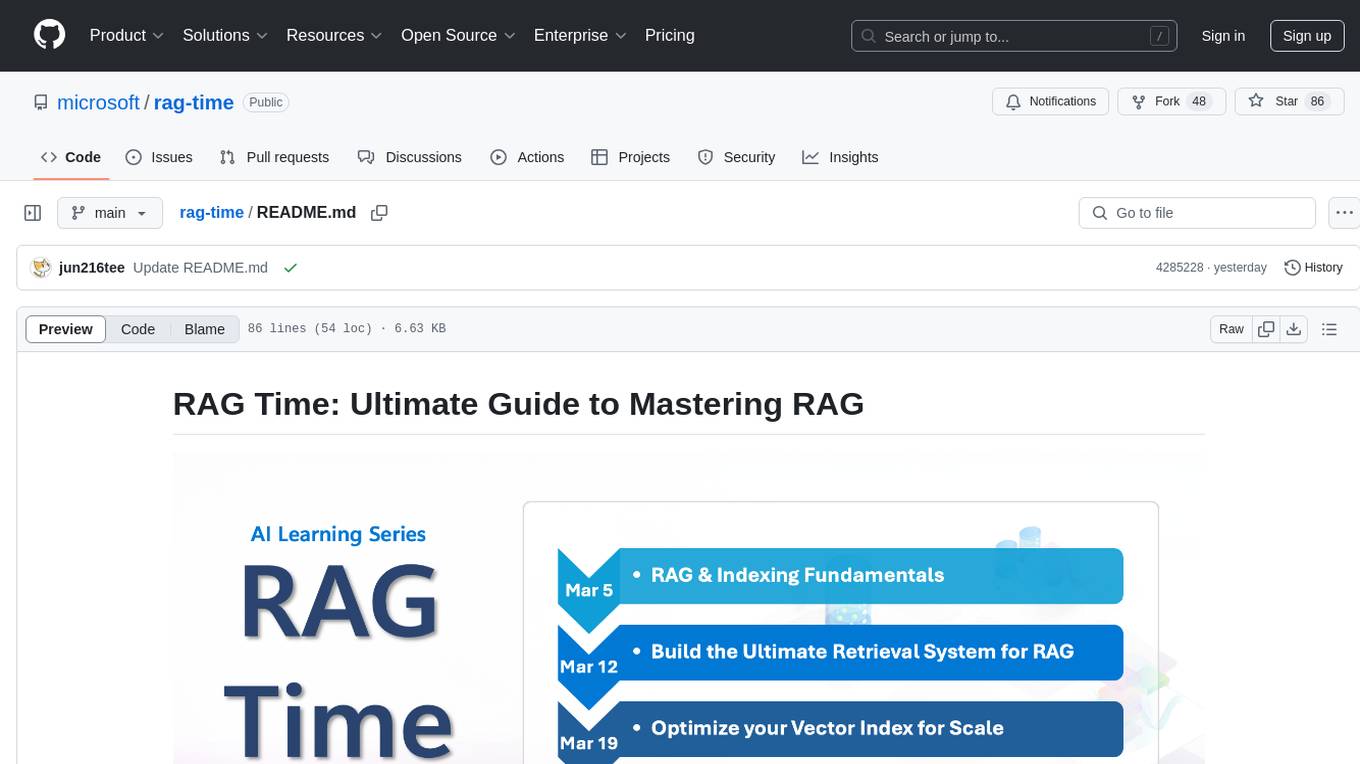
rag-time
RAG Time is a 5-week AI learning series focusing on Retrieval-Augmented Generation (RAG) concepts. The repository contains code samples, step-by-step guides, and resources to help users master RAG. It aims to teach foundational and advanced RAG concepts, demonstrate real-world applications, and provide hands-on samples for practical implementation.
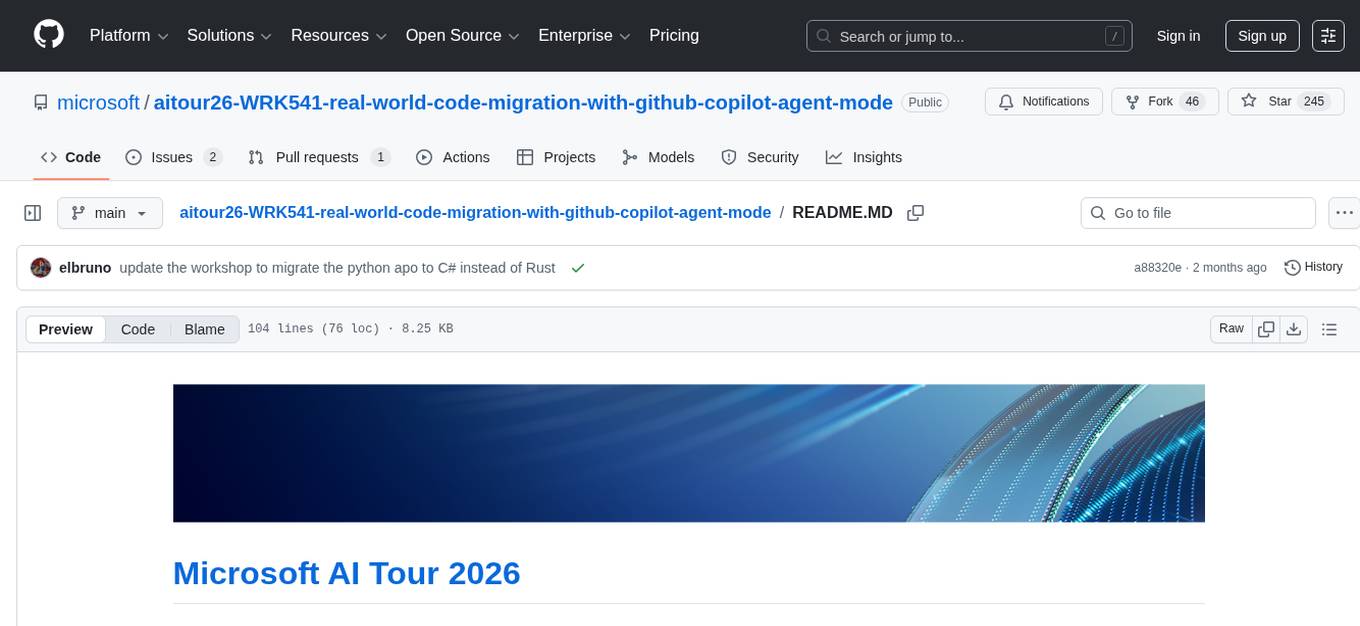
aitour26-WRK541-real-world-code-migration-with-github-copilot-agent-mode
Microsoft AI Tour 2026 WRK541 is a workshop focused on real-world code migration using GitHub Copilot Agent Mode. The session is designed for technologists interested in applying AI pair-programming techniques to challenging tasks like migrating or translating code between different programming languages. Participants will learn advanced GitHub Copilot techniques, differences between Python and C#, JSON serialization and deserialization in C#, developing and validating endpoints, integrating Swagger/OpenAPI documentation, and writing unit tests with MSTest. The workshop aims to help users gain hands-on experience in using GitHub Copilot for real-world code migration scenarios.

AISuperDomain
Aila Desktop Application is a powerful tool that integrates multiple leading AI models into a single desktop application. It allows users to interact with various AI models simultaneously, providing diverse responses and insights to their inquiries. With its user-friendly interface and customizable features, Aila empowers users to engage with AI seamlessly and efficiently. Whether you're a researcher, student, or professional, Aila can enhance your AI interactions and streamline your workflow.

second-brain-ai-assistant-course
This open-source course teaches how to build an advanced RAG and LLM system using LLMOps and ML systems best practices. It helps you create an AI assistant that leverages your personal knowledge base to answer questions, summarize documents, and provide insights. The course covers topics such as LLM system architecture, pipeline orchestration, large-scale web crawling, model fine-tuning, and advanced RAG features. It is suitable for ML/AI engineers and data/software engineers & data scientists looking to level up to production AI systems. The course is free, with minimal costs for tools like OpenAI's API and Hugging Face's Dedicated Endpoints. Participants will build two separate Python applications for offline ML pipelines and online inference pipeline.
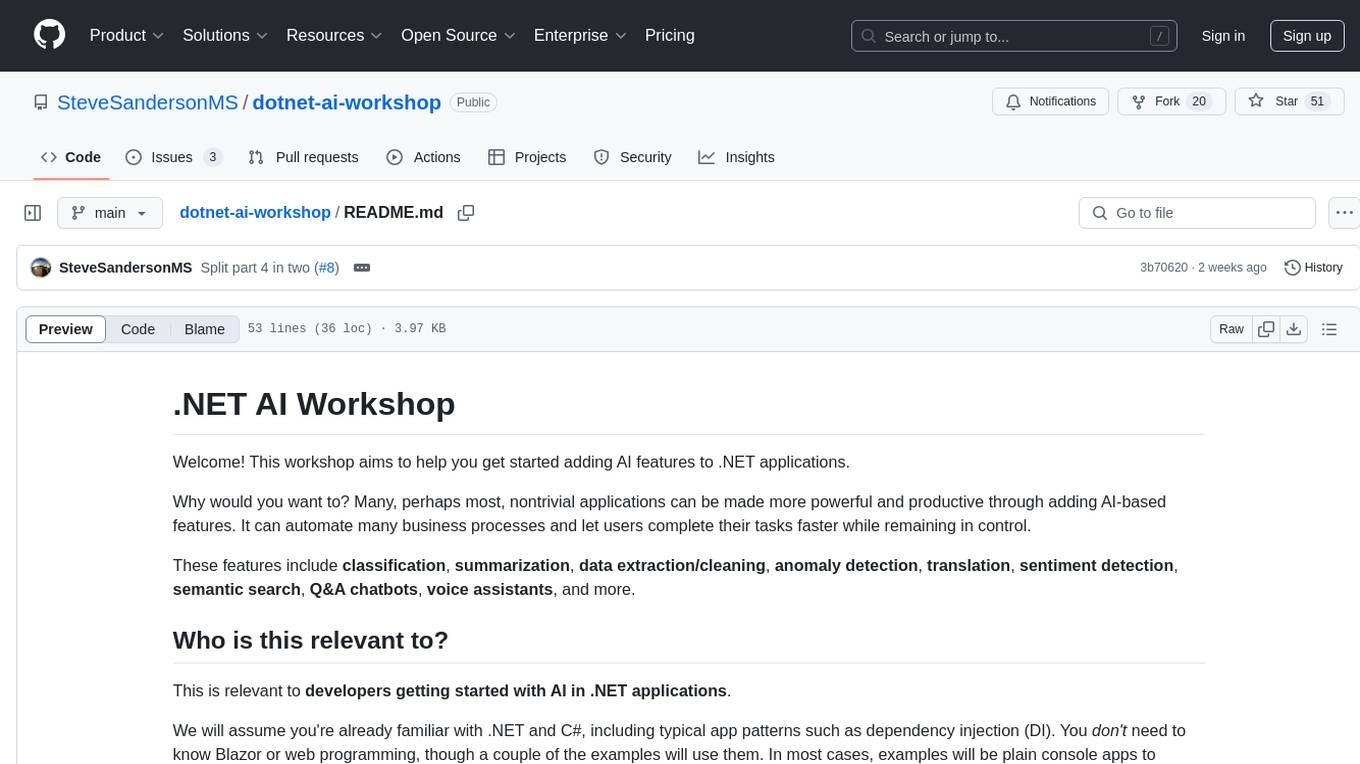
dotnet-ai-workshop
The .NET AI Workshop is a comprehensive guide designed to help developers add AI features to .NET applications. It covers various AI-based features such as classification, summarization, data extraction/cleaning, anomaly detection, translation, sentiment detection, semantic search, Q&A chatbots, and voice assistants. The workshop is tailored for developers new to AI in .NET applications, focusing on the usage of AI services without the need for prior AI technology knowledge. It provides examples using .NET and C# with a focus on AI topics, aiming to enhance productivity and automation in applications.
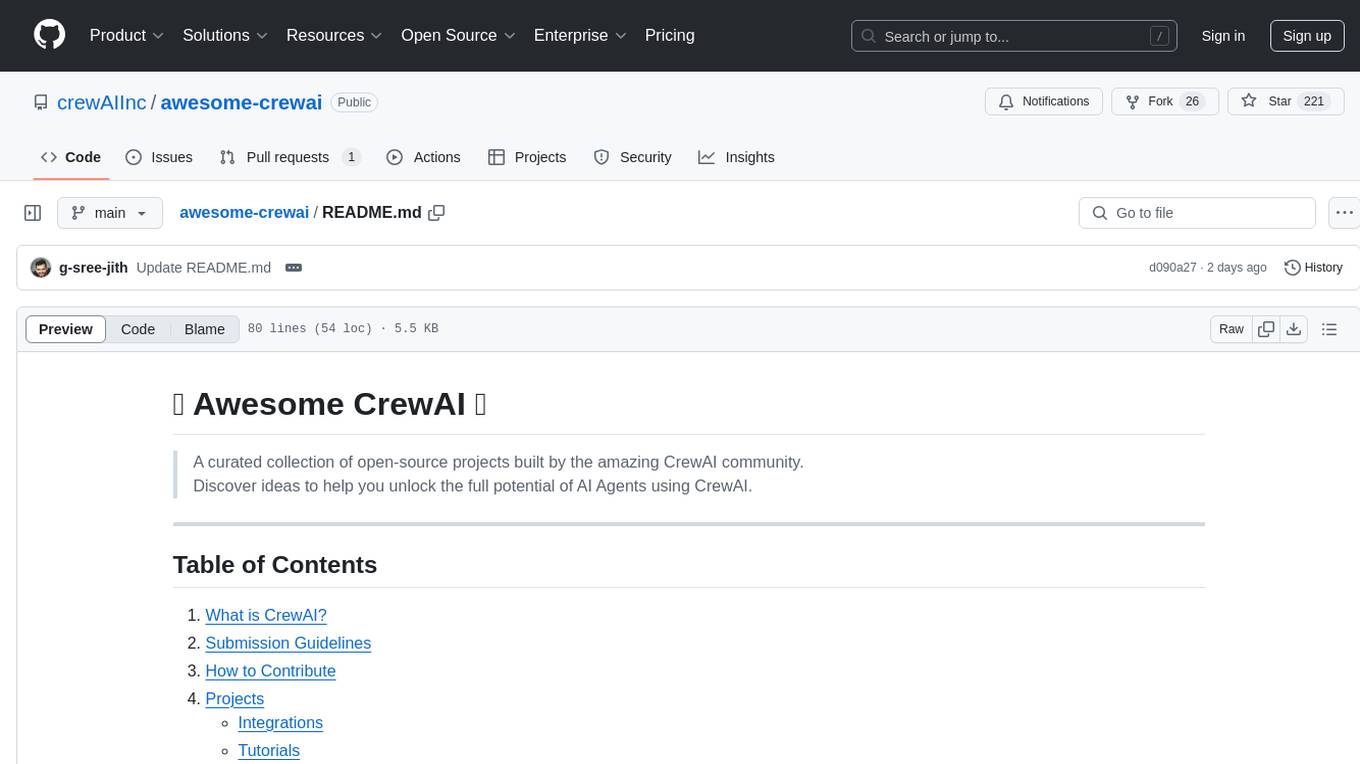
awesome-crewai
Awesome CrewAI is a curated collection of open-source projects built by the CrewAI community, aimed at unlocking the full potential of AI agents for supercharging business processes and decision-making. It includes integrations, tutorials, and tools that showcase the capabilities of CrewAI in various domains.
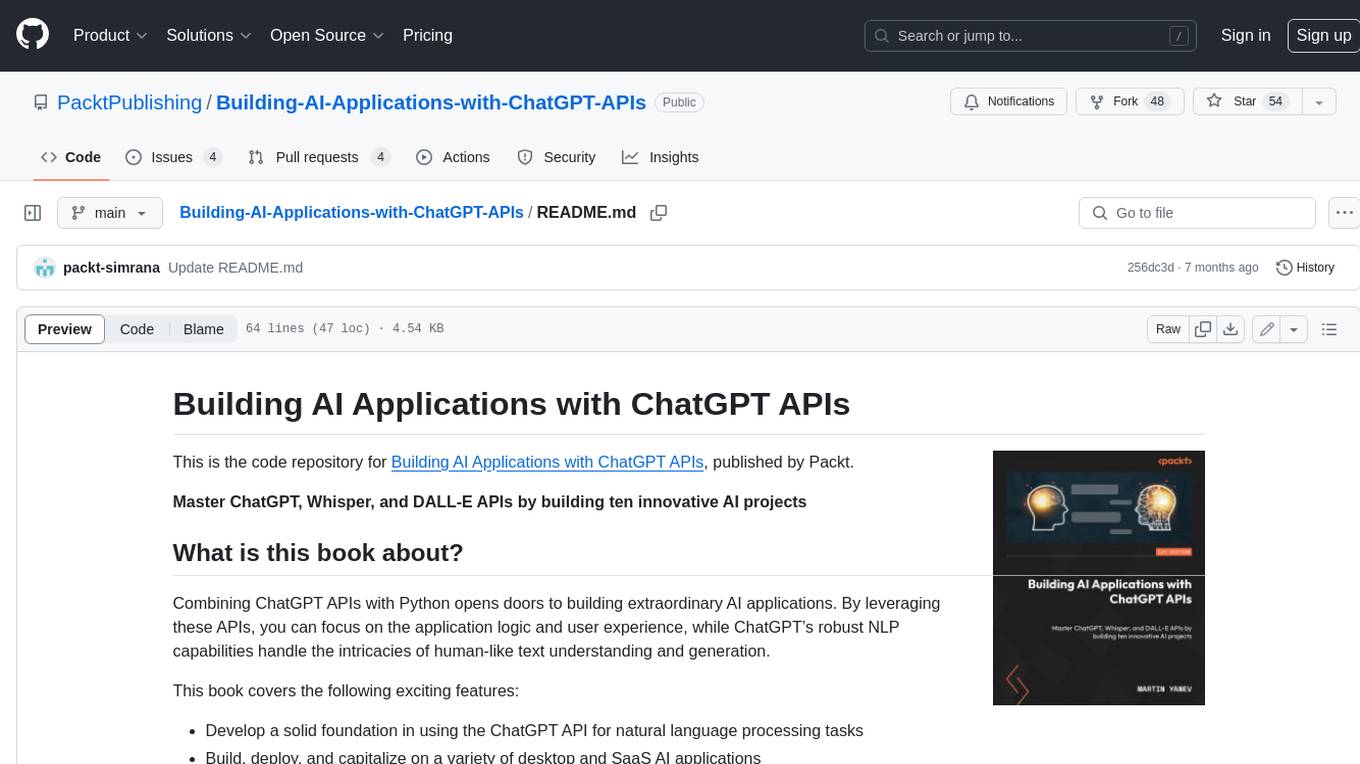
Building-AI-Applications-with-ChatGPT-APIs
This repository is for the book 'Building AI Applications with ChatGPT APIs' published by Packt. It provides code examples and instructions for mastering ChatGPT, Whisper, and DALL-E APIs through building innovative AI projects. Readers will learn to develop AI applications using ChatGPT APIs, integrate them with frameworks like Flask and Django, create AI-generated art with DALL-E APIs, and optimize ChatGPT models through fine-tuning.
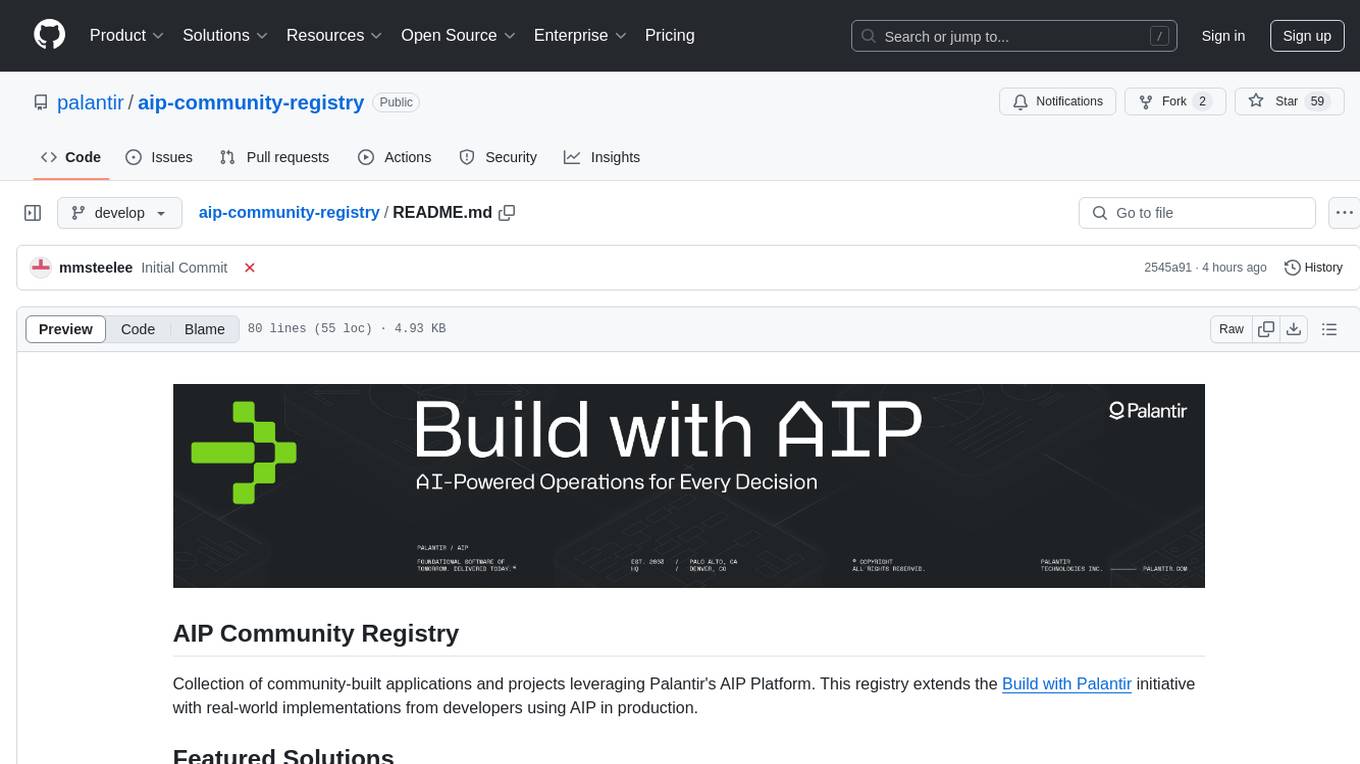
aip-community-registry
AIP Community Registry is a collection of community-built applications and projects leveraging Palantir's AIP Platform. It showcases real-world implementations from developers using AIP in production. The registry features various solutions demonstrating practical implementations and integration patterns across different use cases.
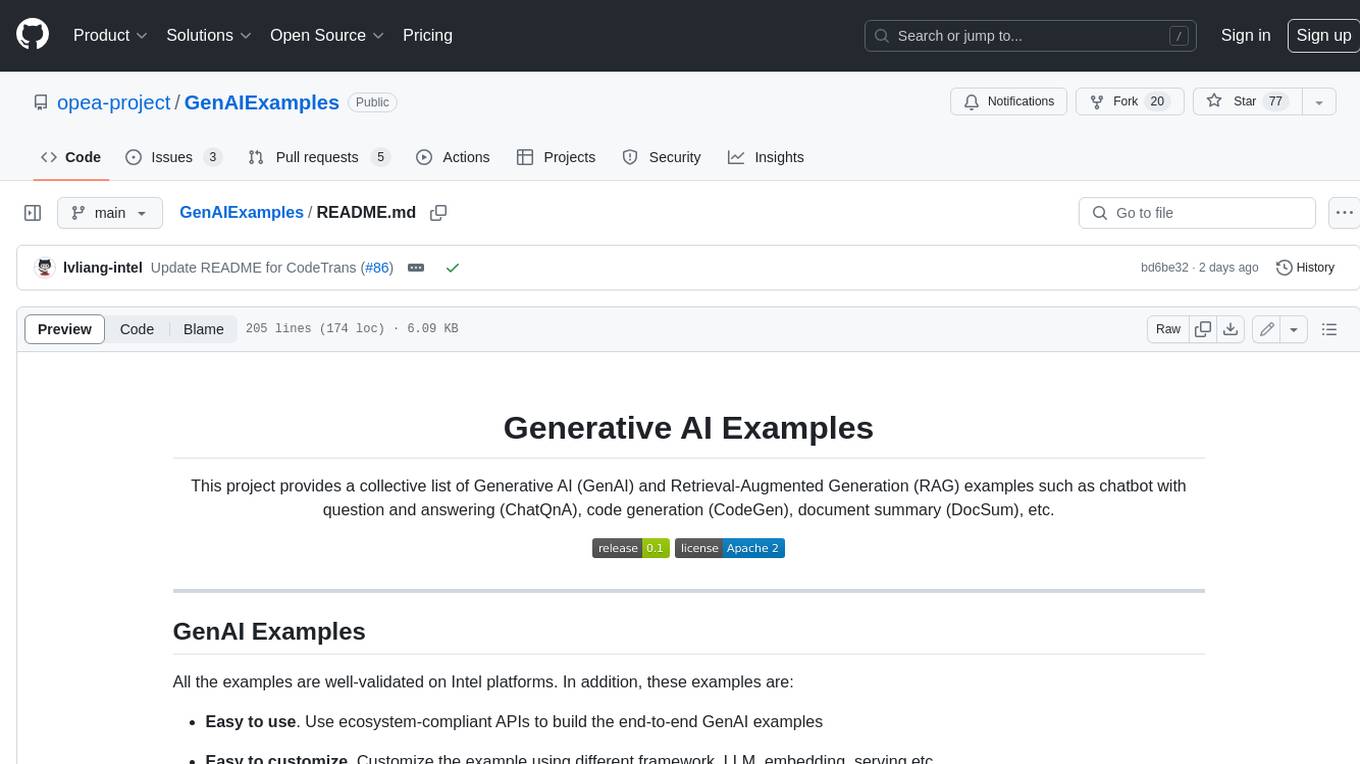
GenAIExamples
This project provides a collective list of Generative AI (GenAI) and Retrieval-Augmented Generation (RAG) examples such as chatbot with question and answering (ChatQnA), code generation (CodeGen), document summary (DocSum), etc.
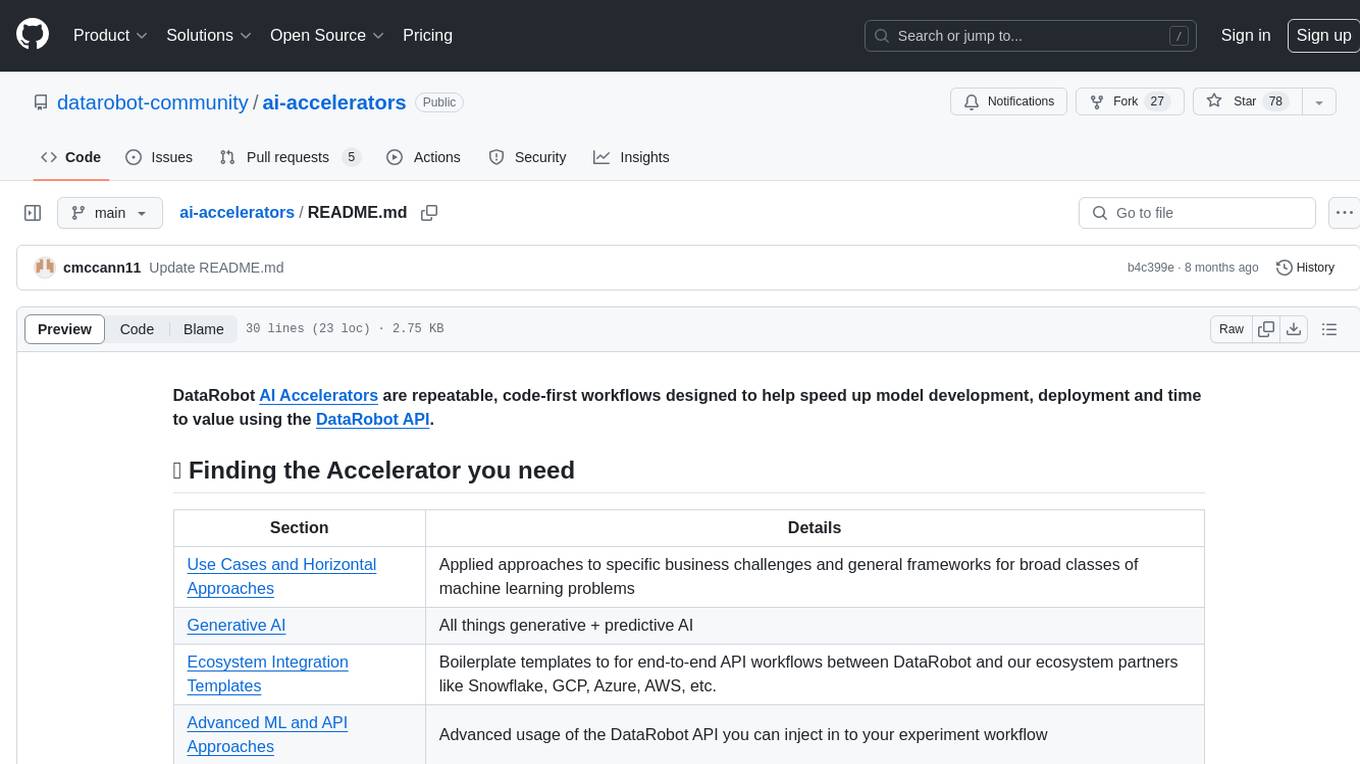
ai-accelerators
DataRobot AI Accelerators are code-first workflows to speed up model development, deployment, and time to value using the DataRobot API. The accelerators include approaches for specific business challenges, generative AI, ecosystem integration templates, and advanced ML and API usage. Users can clone the repo, import desired accelerators into notebooks, execute them, learn and modify content to solve their own problems.
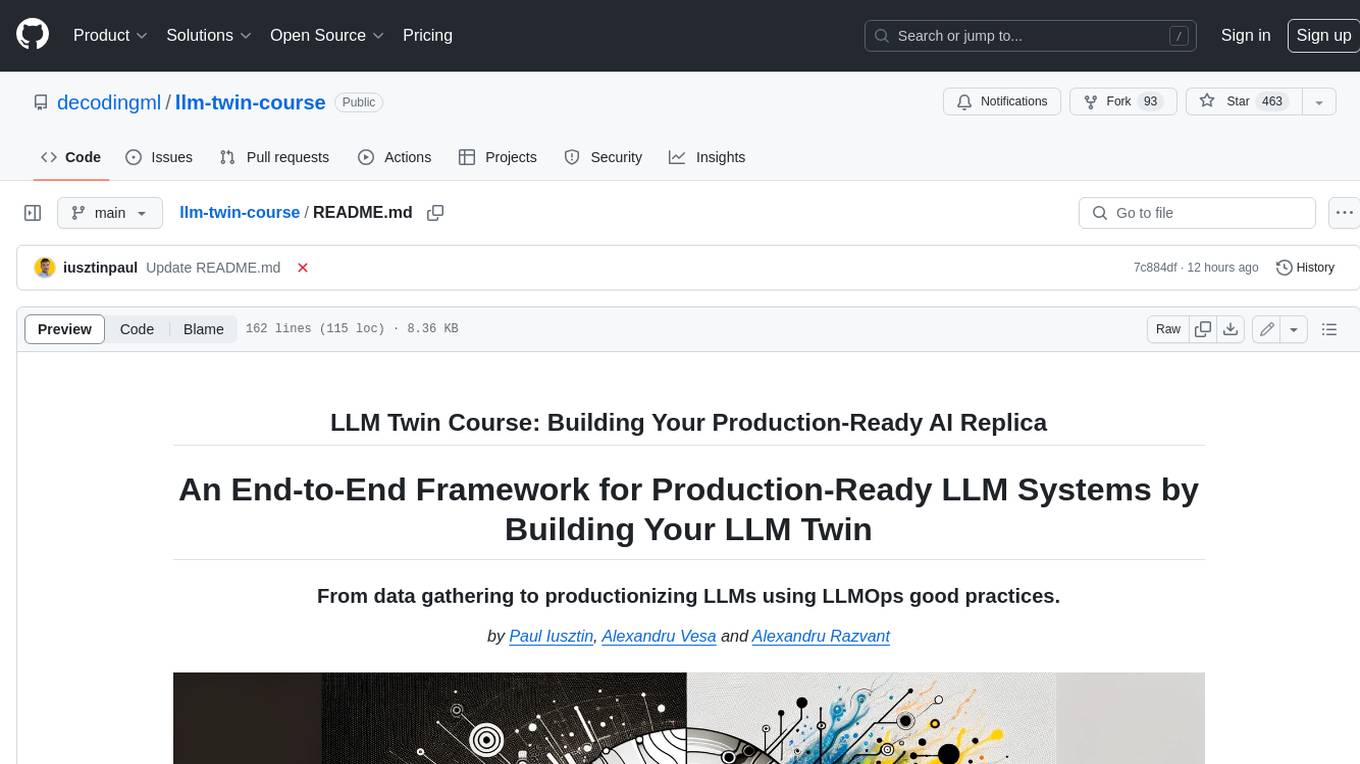
llm-twin-course
The LLM Twin Course is a free, end-to-end framework for building production-ready LLM systems. It teaches you how to design, train, and deploy a production-ready LLM twin of yourself powered by LLMs, vector DBs, and LLMOps good practices. The course is split into 11 hands-on written lessons and the open-source code you can access on GitHub. You can read everything and try out the code at your own pace.
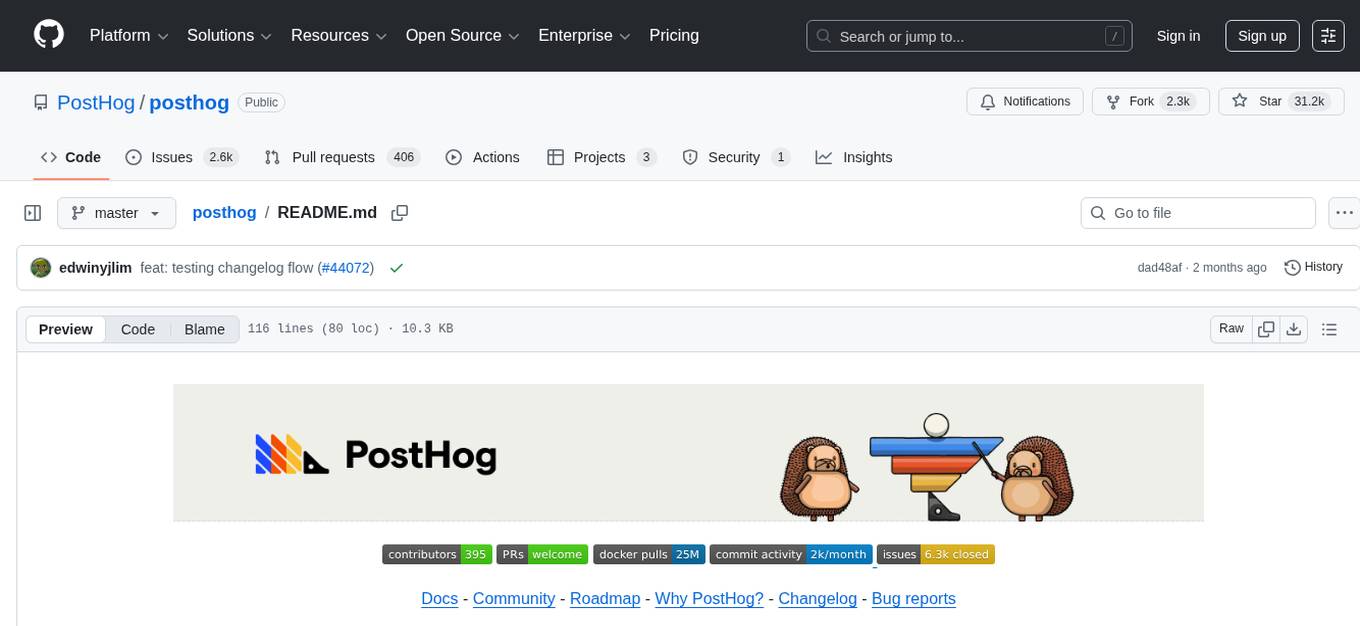
posthog
PostHog is an all-in-one, open source platform for building successful products. It provides tools for product analytics, web analytics, session replays, feature flags, experiments, error tracking, surveys, data warehouse, data pipelines, LLM analytics, and workflows. Users can get started with a generous free tier, self-host the platform, or use PostHog Cloud. The platform supports various SDKs and libraries for popular languages and frameworks, making it versatile and easy to integrate. PostHog is suitable for teams looking to understand user behavior, improve product performance, and automate actions or messages to users.
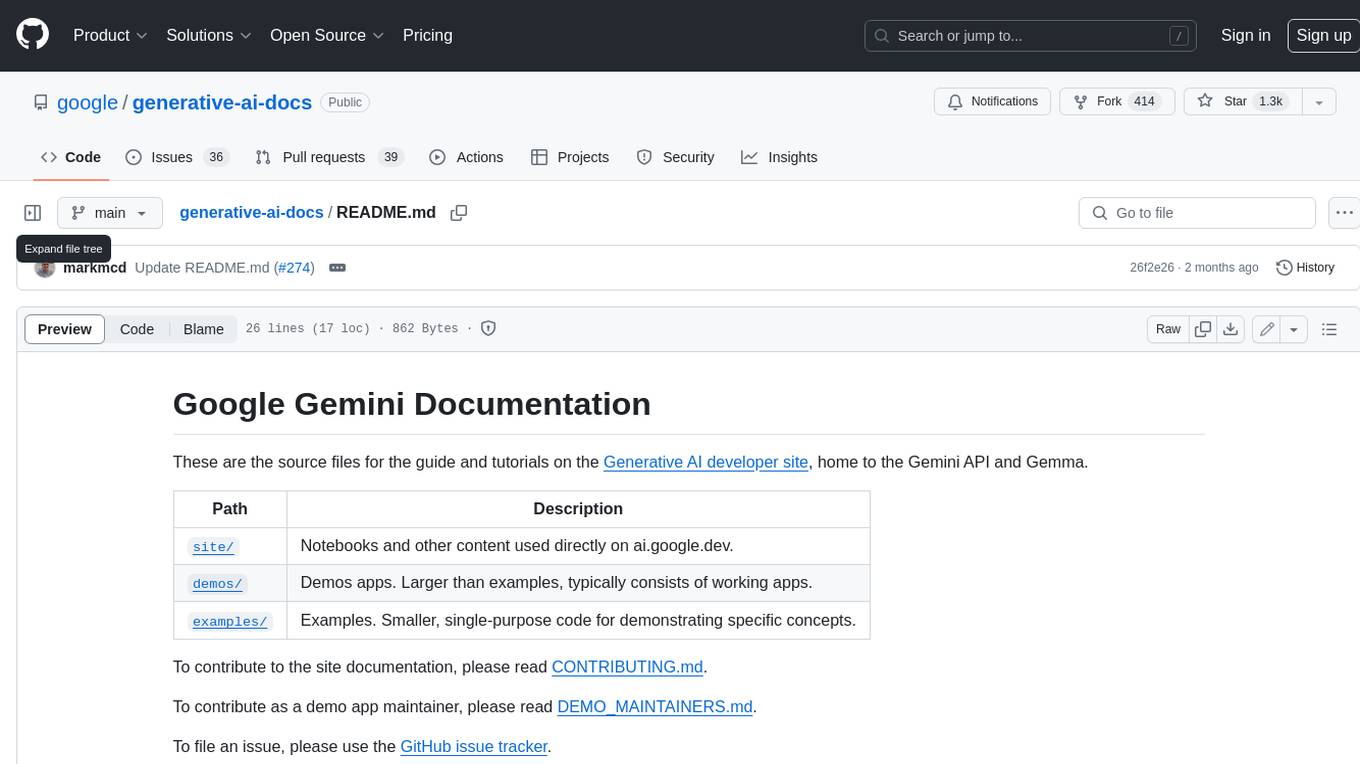
generative-ai-docs
The Google Gemini Documentation repository contains the source files for the guide and tutorials on the Generative AI developer site, which is home to the Gemini API and Gemma. The repository includes notebooks and other content used directly on ai.google.dev, as well as demos and examples. To contribute to the site documentation, please read CONTRIBUTING.md. To contribute as a demo app maintainer, please read DEMO_MAINTAINERS.md. To file an issue, please use the GitHub issue tracker.
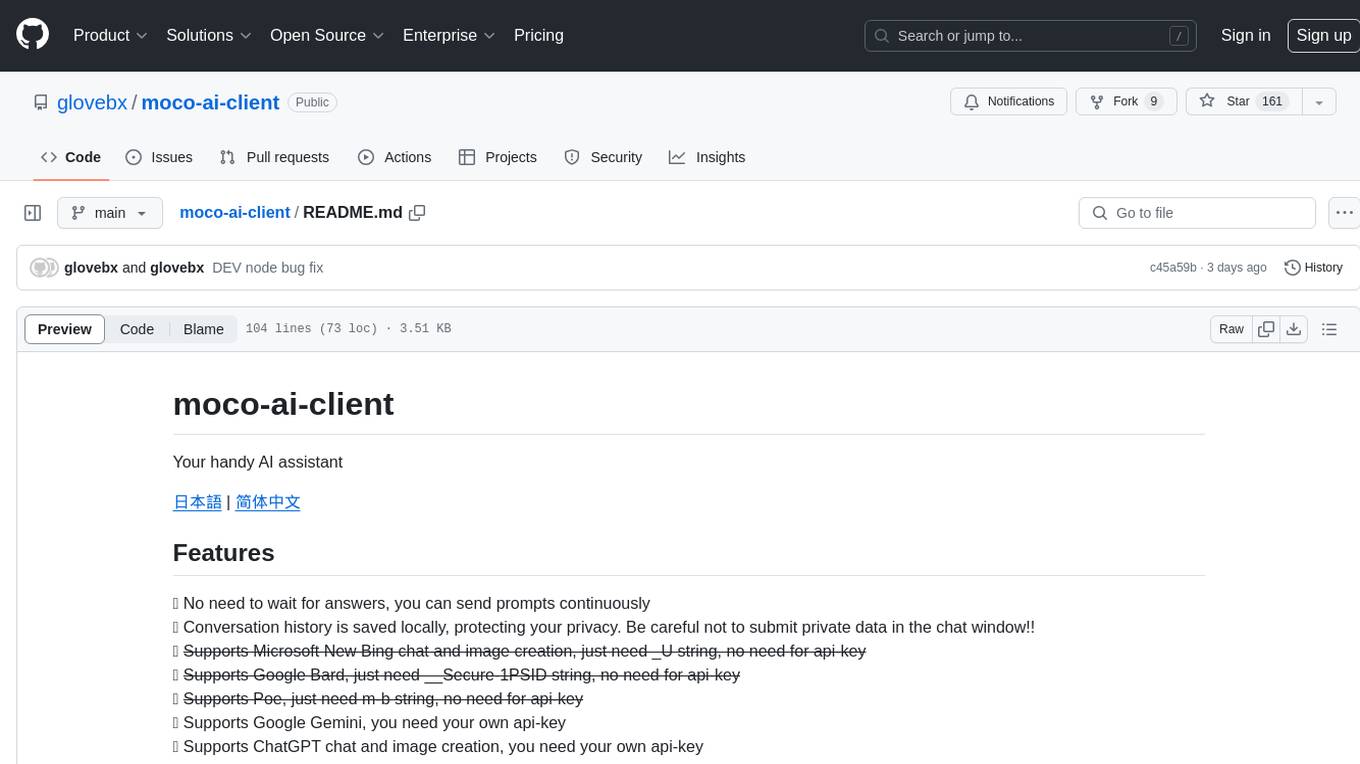
moco-ai-client
The moco-ai-client is an AI assistant tool that allows users to send prompts continuously without waiting for answers. It saves conversation history locally to protect privacy. The tool supports various AI services like Google Gemini, ChatGPT, and GPT3.5. It also enables voice input in Chinese and English, text-to-speech in multiple languages, and image generation. Users can customize roles and share content easily. The tool is under development, and suggestions are welcome for improvements.
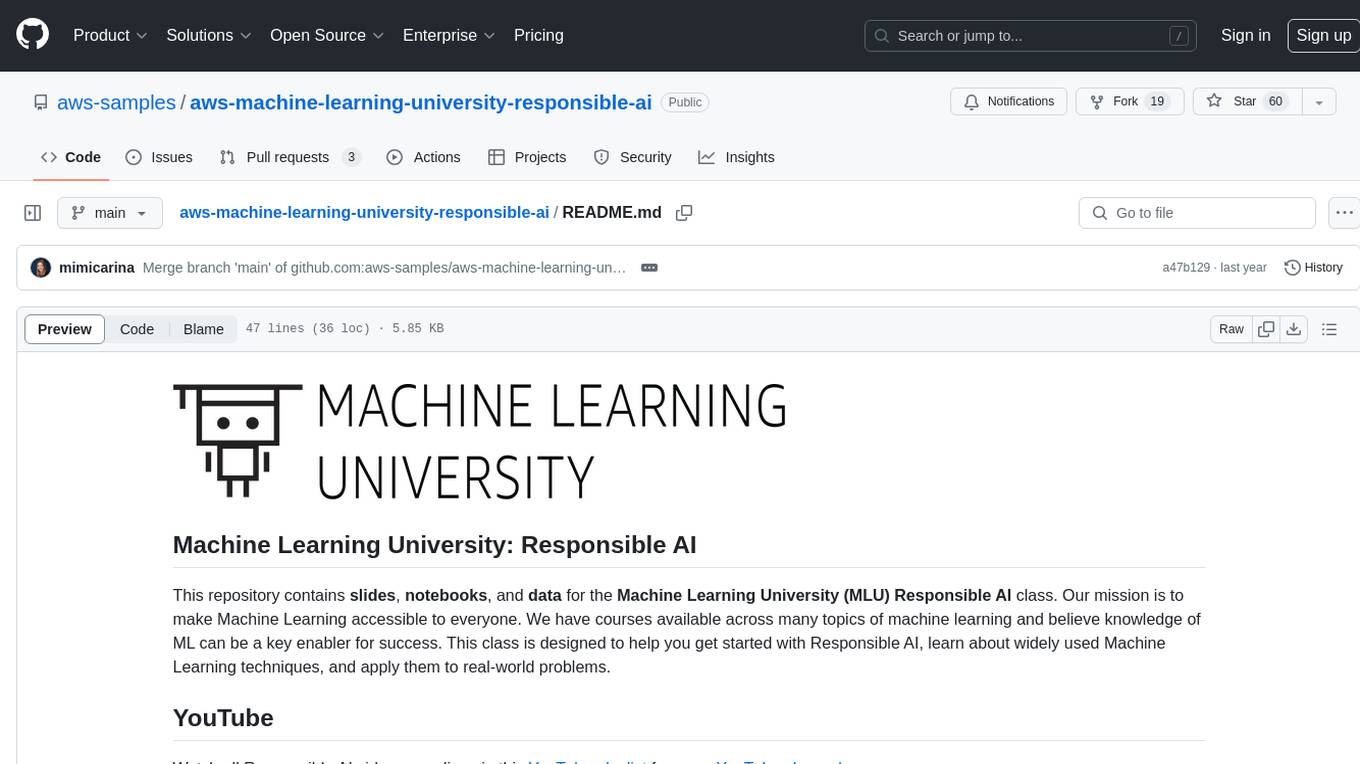
aws-machine-learning-university-responsible-ai
This repository contains slides, notebooks, and data for the Machine Learning University (MLU) Responsible AI class. The mission is to make Machine Learning accessible to everyone, covering widely used ML techniques and applying them to real-world problems. The class includes lectures, final projects, and interactive visuals to help users learn about Responsible AI and core ML concepts.
For similar tasks
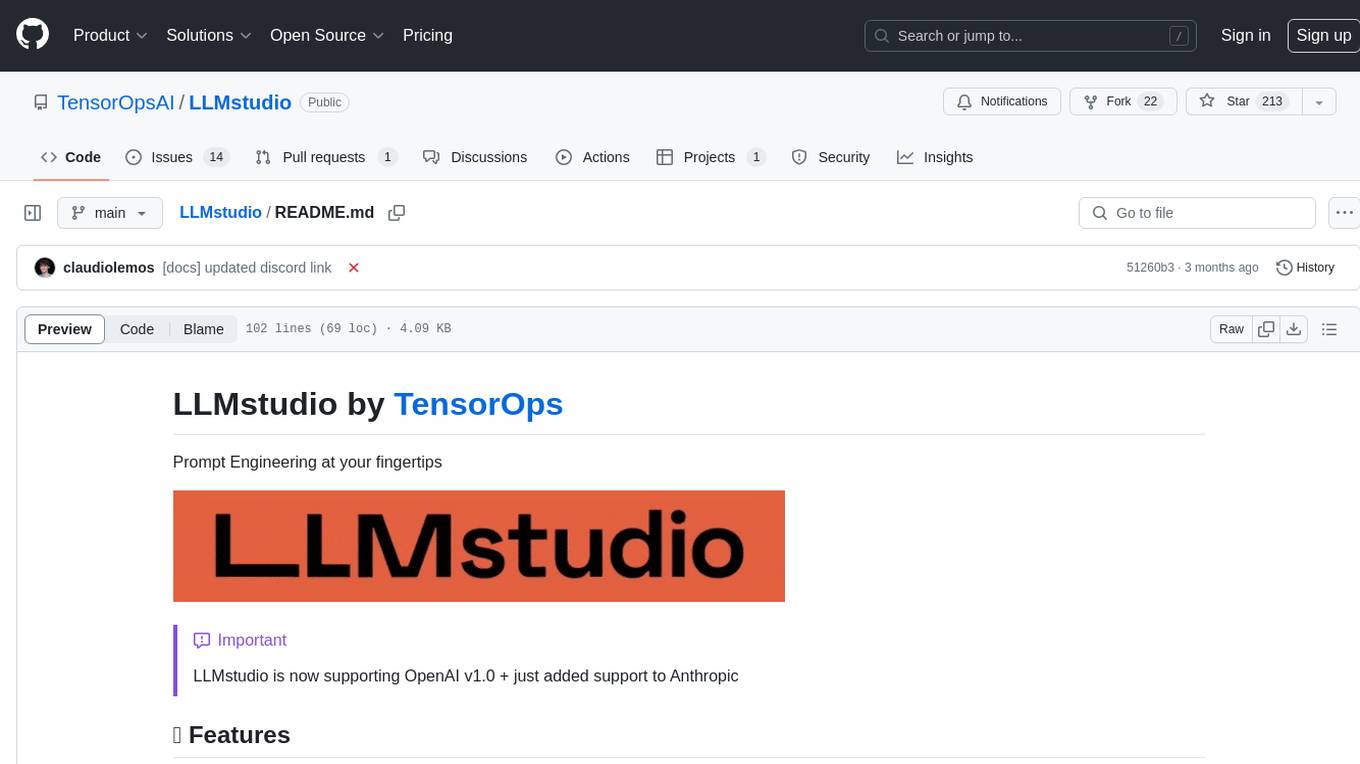
LLMstudio
LLMstudio by TensorOps is a platform that offers prompt engineering tools for accessing models from providers like OpenAI, VertexAI, and Bedrock. It provides features such as Python Client Gateway, Prompt Editing UI, History Management, and Context Limit Adaptability. Users can track past runs, log costs and latency, and export history to CSV. The tool also supports automatic switching to larger-context models when needed. Coming soon features include side-by-side comparison of LLMs, automated testing, API key administration, project organization, and resilience against rate limits. LLMstudio aims to streamline prompt engineering, provide execution history tracking, and enable effortless data export, offering an evolving environment for teams to experiment with advanced language models.
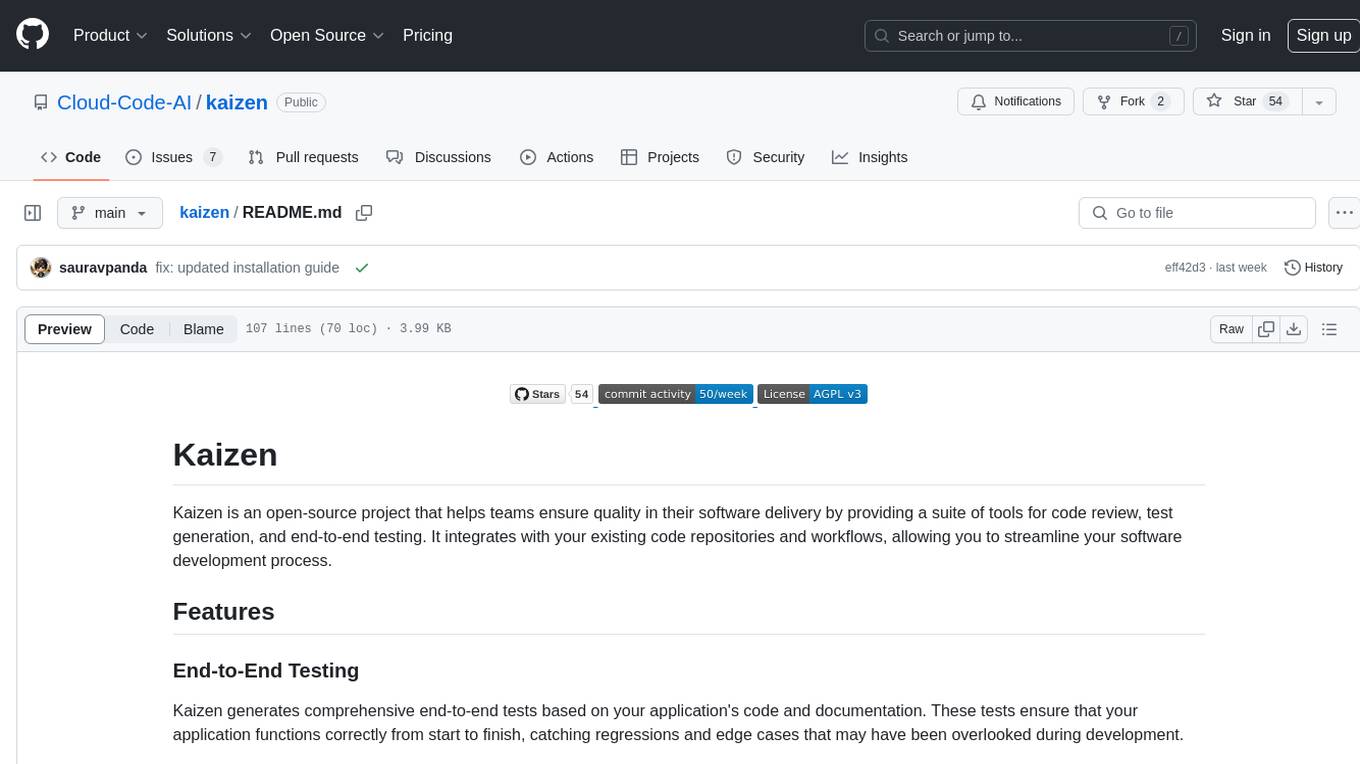
kaizen
Kaizen is an open-source project that helps teams ensure quality in their software delivery by providing a suite of tools for code review, test generation, and end-to-end testing. It integrates with your existing code repositories and workflows, allowing you to streamline your software development process. Kaizen generates comprehensive end-to-end tests, provides UI testing and review, and automates code review with insightful feedback. The file structure includes components for API server, logic, actors, generators, LLM integrations, documentation, and sample code. Getting started involves installing the Kaizen package, generating tests for websites, and executing tests. The tool also runs an API server for GitHub App actions. Contributions are welcome under the AGPL License.
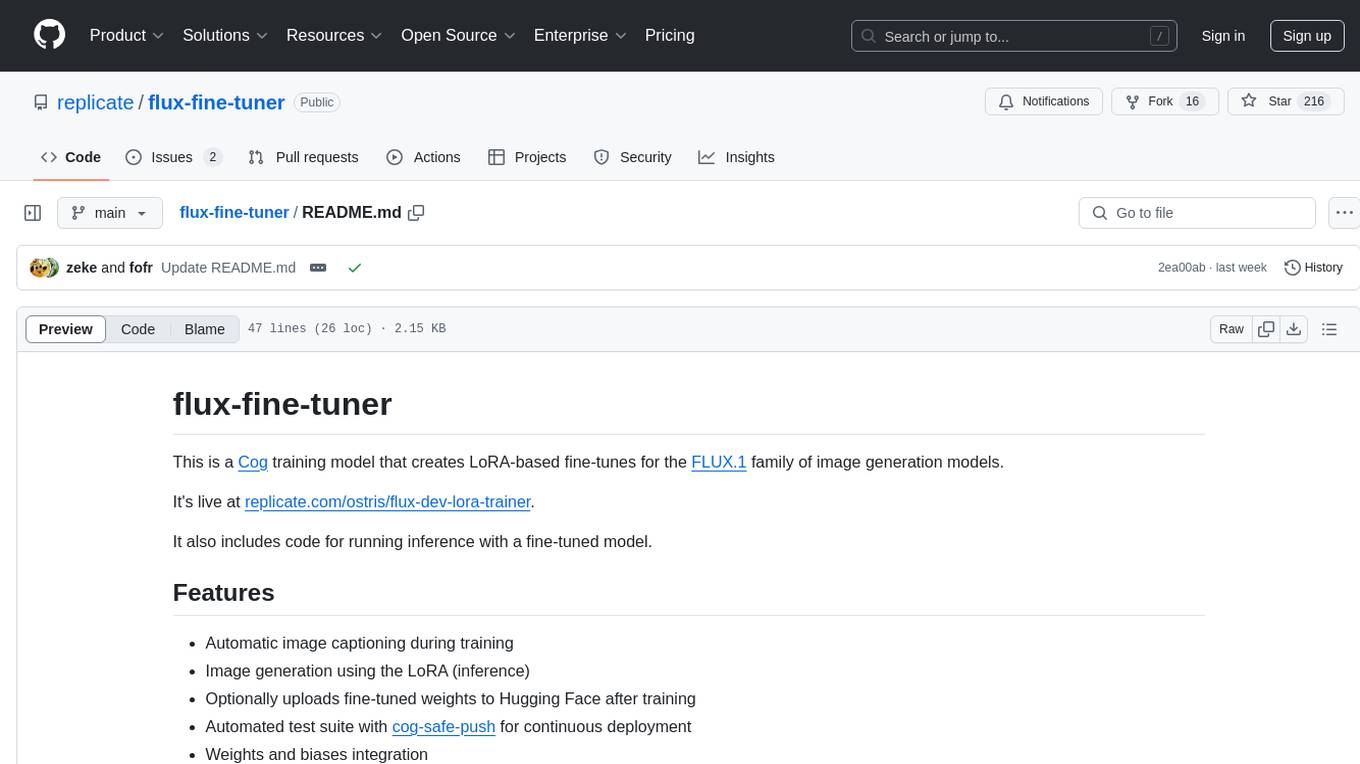
flux-fine-tuner
This is a Cog training model that creates LoRA-based fine-tunes for the FLUX.1 family of image generation models. It includes features such as automatic image captioning during training, image generation using LoRA, uploading fine-tuned weights to Hugging Face, automated test suite for continuous deployment, and Weights and biases integration. The tool is designed for users to fine-tune Flux models on Replicate for image generation tasks.
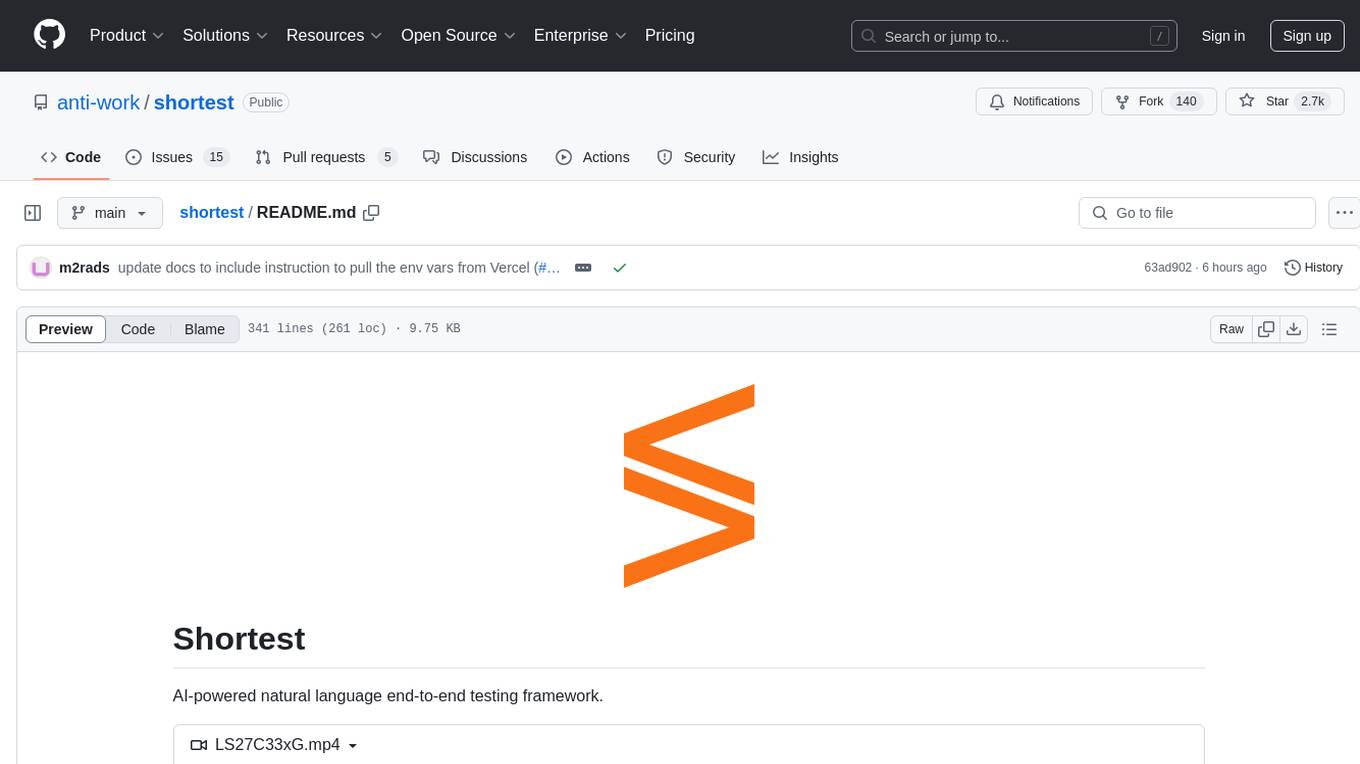
shortest
Shortest is an AI-powered natural language end-to-end testing framework built on Playwright. It provides a seamless testing experience by allowing users to write tests in natural language and execute them using Anthropic Claude API. The framework also offers GitHub integration with 2FA support, making it suitable for testing web applications with complex authentication flows. Shortest simplifies the testing process by enabling users to run tests locally or in CI/CD pipelines, ensuring the reliability and efficiency of web applications.
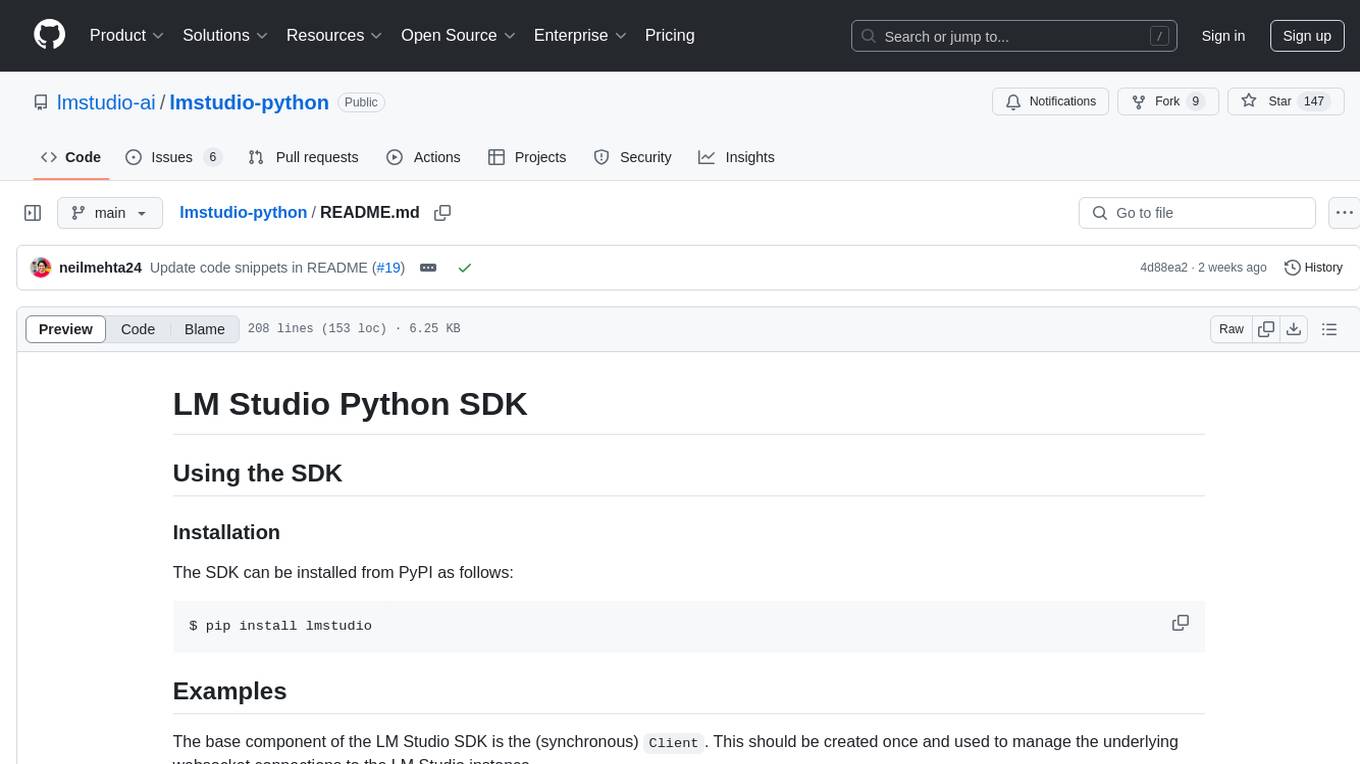
lmstudio-python
LM Studio Python SDK provides a convenient API for interacting with LM Studio instance, including text completion and chat response functionalities. The SDK allows users to manage websocket connections and chat history easily. It also offers tools for code consistency checks, automated testing, and expanding the API.

mastering-github-copilot-for-dotnet-csharp-developers
Enhance coding efficiency with expert-led GitHub Copilot course for C#/.NET developers. Learn to integrate AI-powered coding assistance, automate testing, and boost collaboration using Visual Studio Code and Copilot Chat. From autocompletion to unit testing, cover essential techniques for cleaner, faster, smarter code.
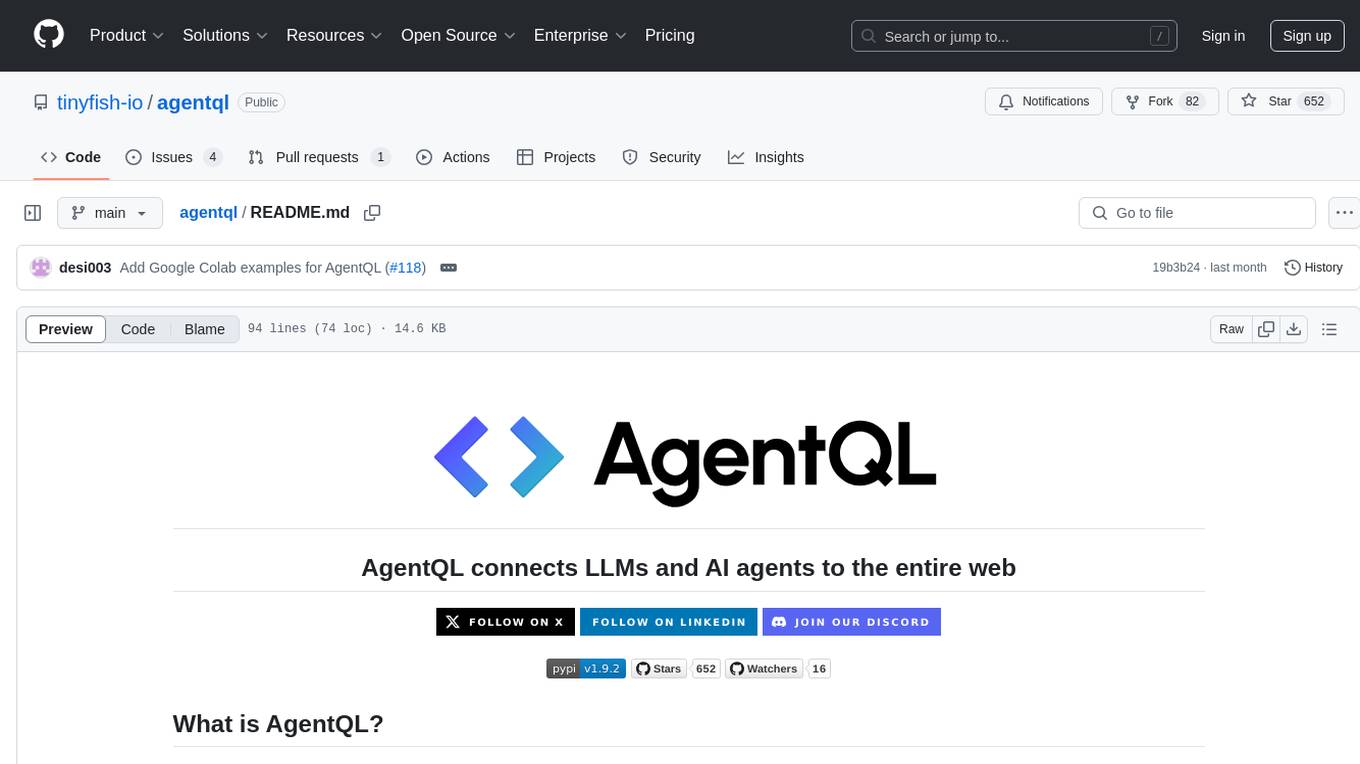
agentql
AgentQL is a suite of tools for extracting data and automating workflows on live web sites featuring an AI-powered query language, Python and JavaScript SDKs, a browser-based debugger, and a REST API endpoint. It uses natural language queries to pinpoint data and elements on any web page, including authenticated and dynamically generated content. Users can define structured data output and apply transforms within queries. AgentQL's natural language selectors find elements intuitively based on the content of the web page and work across similar web sites, self-healing as UI changes over time.
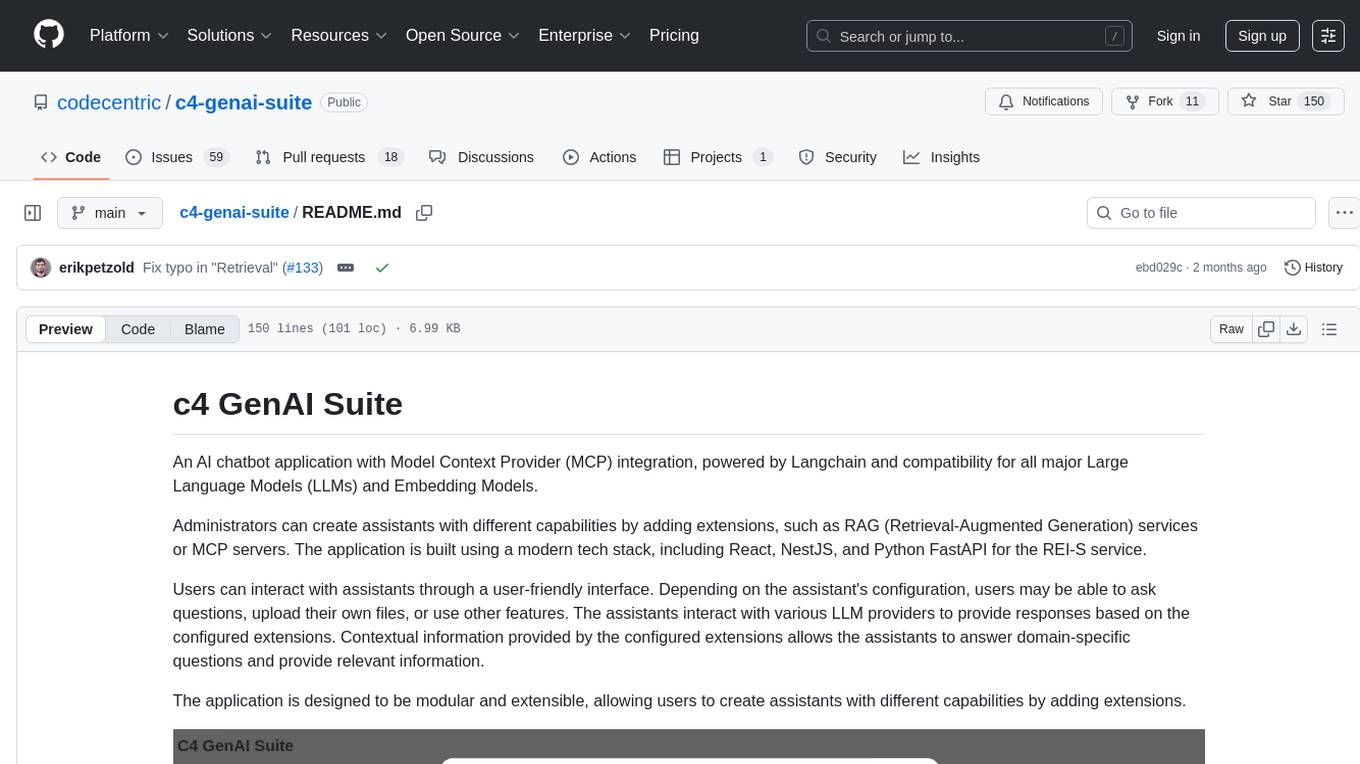
c4-genai-suite
C4-GenAI-Suite is a comprehensive AI tool for generating code snippets and automating software development tasks. It leverages advanced machine learning models to assist developers in writing efficient and error-free code. The suite includes features such as code completion, refactoring suggestions, and automated testing, making it a valuable asset for enhancing productivity and code quality in software development projects.
For similar jobs

sweep
Sweep is an AI junior developer that turns bugs and feature requests into code changes. It automatically handles developer experience improvements like adding type hints and improving test coverage.

teams-ai
The Teams AI Library is a software development kit (SDK) that helps developers create bots that can interact with Teams and Microsoft 365 applications. It is built on top of the Bot Framework SDK and simplifies the process of developing bots that interact with Teams' artificial intelligence capabilities. The SDK is available for JavaScript/TypeScript, .NET, and Python.

ai-guide
This guide is dedicated to Large Language Models (LLMs) that you can run on your home computer. It assumes your PC is a lower-end, non-gaming setup.

classifai
Supercharge WordPress Content Workflows and Engagement with Artificial Intelligence. Tap into leading cloud-based services like OpenAI, Microsoft Azure AI, Google Gemini and IBM Watson to augment your WordPress-powered websites. Publish content faster while improving SEO performance and increasing audience engagement. ClassifAI integrates Artificial Intelligence and Machine Learning technologies to lighten your workload and eliminate tedious tasks, giving you more time to create original content that matters.

chatbot-ui
Chatbot UI is an open-source AI chat app that allows users to create and deploy their own AI chatbots. It is easy to use and can be customized to fit any need. Chatbot UI is perfect for businesses, developers, and anyone who wants to create a chatbot.

BricksLLM
BricksLLM is a cloud native AI gateway written in Go. Currently, it provides native support for OpenAI, Anthropic, Azure OpenAI and vLLM. BricksLLM aims to provide enterprise level infrastructure that can power any LLM production use cases. Here are some use cases for BricksLLM: * Set LLM usage limits for users on different pricing tiers * Track LLM usage on a per user and per organization basis * Block or redact requests containing PIIs * Improve LLM reliability with failovers, retries and caching * Distribute API keys with rate limits and cost limits for internal development/production use cases * Distribute API keys with rate limits and cost limits for students

uAgents
uAgents is a Python library developed by Fetch.ai that allows for the creation of autonomous AI agents. These agents can perform various tasks on a schedule or take action on various events. uAgents are easy to create and manage, and they are connected to a fast-growing network of other uAgents. They are also secure, with cryptographically secured messages and wallets.

griptape
Griptape is a modular Python framework for building AI-powered applications that securely connect to your enterprise data and APIs. It offers developers the ability to maintain control and flexibility at every step. Griptape's core components include Structures (Agents, Pipelines, and Workflows), Tasks, Tools, Memory (Conversation Memory, Task Memory, and Meta Memory), Drivers (Prompt and Embedding Drivers, Vector Store Drivers, Image Generation Drivers, Image Query Drivers, SQL Drivers, Web Scraper Drivers, and Conversation Memory Drivers), Engines (Query Engines, Extraction Engines, Summary Engines, Image Generation Engines, and Image Query Engines), and additional components (Rulesets, Loaders, Artifacts, Chunkers, and Tokenizers). Griptape enables developers to create AI-powered applications with ease and efficiency.
